The Checker Maven
The World's Most Widely Read Checkers and Draughts Publication
Bob Newell, Editor-in-Chief
Published every Saturday morning in Honolulu, Hawai`i
Noticing missing images? An explanation is here.
A May Day Problem

May Day, the first of May, has its presumable roots in the ancient fires of Beltane, but is today celebrated in a number of different ways. In England, May Day is a substantial civic celebration, with traditions such as the Maypole, the May Queen, and much more.

In France, it's customary to give a lilly-of-the-valley to your lady of choice.

In Germany, Walpurgisnacht is celebrated on May Day Eve (Faust, anyone?).

May Day is also a Roman Catholic holiday. And finally, May Day is celebrated by the international labor movement as a day of the worker, and in some countries, military parades are held.

While we don't in any way accord with the philosophies of these aforesaid countries, most of whom repressed and exploited the worker while pretending to act in his interests, we think a checker problem that Tom Wiswell originally called "Victory" is appropriate. On May Day, the ancient traditions celebrated the victory of light over darkness, with the advent of spring and the coming of longer days. And we note that in the end, when the Communist system collapsed some years ago, the worker really was the victor---1.
So here's our celebratory problem, and as usual for a Tom Wiswell piece, it's a dandy. It's anything but easy, but it's worth the effort.
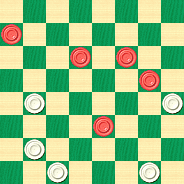
WHITE
White to Play and Win
W:W17,20,25,30,32:B5,10,11,16,23.
1---The Checker Maven makes no apologies for its pro-democracy position.
March on to victory, but if it rains on your parade, click Read More to see the delightful solution.![]()
Two Parts from Denvir

We're not talking today about the city of Denver, as attractive and appealing as that modern metropolis might be. Instead, we're talking about John Denvir (and neither do we mean the late popular musician who called himself John Denver). John T. Denvir was a well-known checker player and author in the early 1900s, and was, to put it mildly, a man of controversy. He did publish a number of checker instruction books, and today's two-part problem is drawn from one of them.
First, look at this position arising from a Single Corner opening:
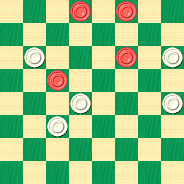
WHITE
White to Play and Draw
W:W22,20,18,12,9:B14,11,3,2.
White has drawing moves here, and it's not so hard to find them. We invite you to give it a try.
One way not to draw is with the seemingly clever 20-16, which results in this position.
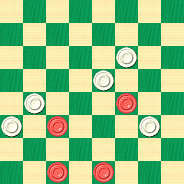
BLACK
Black to Play and Win
B:W22,18,16,12,9:B14,11,3,2.
Can you find a win for Black at this point?
If you don't find the solutions, you needn't travel all the way to Denver to see how it's done; clicking on Read More will transport you immediately to the answers.![]()
Springing Into Spring

Spring has come to the northern hemisphere, and our rather impressive long jumper in the photo above is literally springing into spring as the outdoor season arrives. But even with our irrepressible urge to get out of the house and into the fine fresh air, we know you still have a little time to keep up with your game of checkers.
In this week's column we help you do just that, with a nice speed problem that will give you a little practice without keeping you inside for too long. We rank it as "medium" on the difficulty scale and allow you ... one minute. After all, the sunshine and blue skies are calling you!
Click below to show the problem and start the clock, then click on Read More to check your solution.
April Speed Problem (medium; 60 seconds)
![]()
Double Crossing

A very complex-looking double crossing is to be found in the model railway section pictured above. We wonder, though, if it's equal in complexity to today's checker problem, which, most appropriately, arises in a line of the Double Cross opening. The Double Cross, arising from 9-14 23-18, has a bit of shall we say a checkered reputation, with 23-18 being at best a weak reply to 9-14. Nevertheless, it's completely playable if you know what you're doing, but there's plenty of opportunity to go astray.
But for now, let's jump right into our position, in which White has indeed strayed from the narrow path.
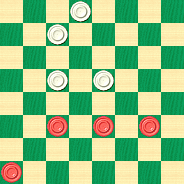
BLACK
Black to Play and Win
B:W31,27,19,18:B11,10,9,4.
Can you find the Black win, or will you get all crossed up? Don't be cross about it; clicking on Read More brings you the solution, the run-up to the position, and the usual explanatory notes.![]()
Faster, Cheaper, Better
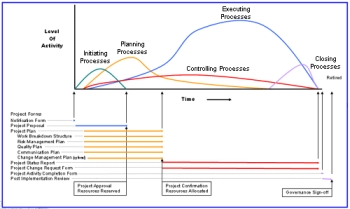
There's an old maxim well known in formal project management practice: "Faster - Cheaper - Better: Choose two." Or, in the words of that yesteryear Cambridge, Massachusetts salesman known simply as Cheap Al: "You can't have all the goodies for nothing."
This month's speed problem indeed calls upon two of the three attributes mentioned in our title, namely, faster and better. Although the problem is quite easy, you'll need to be fast and rather a better player to solve this one within the very brief allowed time. Of course, "cheaper" doesn't enter into the picture as The Checker Maven always has been and always will be a free publication. Sorry Al, but maybe you can have all the goodies for nothing!
Click on the link below to show our problem and start the unforgiving JavaScript clock.
March Speed Problem (very easy)
When you're done, clicking on Read More gives you a faster, cheaper, and better way to see the correct solution.![]()
Valentine's Day Celebration

Valentine's Day is the traditional day of romance, yet we are certain that our game of checkers and romance are seldom associated. More's the pity, as we can see in the photo of the young folks just above, and the wonderful picture of the older folks just below.

We like to think that checkers can be an important part of a romantic relationship. Consider: checkers is good clean fun; it's sociable; and it's an inexpensive activity. It's one of the overlooked simple things that can add a lot to a couple's time together.
To celebrate Valentine's Day, here's a checker problem that is of moderate difficulty; we propose that it's just the right thing for you and your Significant Other to work on during a pleasant hour together, perhaps over a soda or a pot of tea. And who knows where it all might lead?

BLACK
Black to Play and Win
B:W25,22,21,20,K3:BK31,14,13,10,2.
Put your heart into finding the answer, then click on Read More for the charming solution.![]()
Winter Speedster

Here in much of North America we're mired in the depths of winter, but that doesn't seem to faze our speed skater in the picture above. He's having a great time out on the ice, making the most of the season.
At home, there's nothing like a checker problem to help us make the most of the season too, and this month we bring you an easy speed problem that will cheer you, even if it won't quite last through a whole cup of tea. In fact, it's easy enough that we think 10 seconds is plenty of time.
When you're ready, click on the link below and speed to your solution. After you're done, click on Read More to check your answer.
February Speed Problem (easy)
![]()
Marvin Returns to St. Louis

Marvin J. Mavin was back in St. Louis on a good-will tour, working in the inner-city schools with disadvantaged children. It was one of his favorite charitable activities and Marvin took every opportunity to further this cause.

But there were other items on Marvin's agenda for this visit. Marvin was scheduled to play an exhibition game at the St. Louis Civic Society Auditorium against the countywide amateur champion, Hinkley B. Dinkley. It was rumored that a number of major league scouts would be in attendance, with their eyes on Mr. Dinkley, who had made such a showing in amateur play that a professional contract was a real possibility. Mr. Dinkley, however, was also considering becoming a tennis pro; tennis seemed to be his real love, even though a major league checker career would be far more lucrative.

It seems, however, that prior to the game, Marvin made an unscheduled and rather prolonged stop--- at St. Louis' landmark Mudvisor Brewery. The press was not allowed to follow Marvin while he took a tour of the brewery, a tour that normally lasts about 30 minutes, though Marvin was not seen to exit the grounds until more than two hours had elapsed. Just what was Marvin doing during all of that time?
But now, Marvin and Hinkley were seated before the checkerboard, shaking hands and exchanging pre-game greetings.
"Ever been to the Mudvisor Brewery, Hink?" asked Marvin.
"Um, the name's Hinkley, and yes, I've been there once or twice. Nothing really special," replied Hinkley.
"Aw, c'mon Hink," Marvin continued, rather oblivious to Hinkley's reply, "they got that Mud Light in there and they give ya samples. Lotsa samples!"
Hinkley declined to reply, as the referee had signaled the start of play. Marvin had Black, and made his opening move.
| 1. | 9-13 |
Marvin leaned back in his chair, clasped his hands on the back of his neck, and chuckled, "Hey, Hink, thought I'd sorta give you a break, being as how you're an amateur and all!"
Hinkley did not reply but simply moved
| 1. | ... | 22-18 |
"Ah, now we're gettin' serious," said Marvin, and the game continued as follows.
| 2. | 12-16 | 24-20 |
| 3. | 8-12 | 25-22 |
| 4. | 16-19 |
Hinkley suddenly sat up straight, staring intently at the board, with an astonished look on his face. He blinked his eyes, blinked again, and continued to stare at the pieces.
"Whaddya lookin....." Marvin started to say, but he abruptly cut off his sentence, and then muttered, "Uh-oh...."
The forced exchanges took place, and then it was again Hinkley's turn.
| 4. | ... | 23-16 |
| 5. | 12-19 |
Hinkley thought for a few more minutes, and then looked Marvin straight in the eye and said, "Marvin, I think your visit to Mudvisor was ill advised," whereupon, Hinkley made his move.
Can you figure out what's going on here? Did Marvin make an error? What move had Hinkley been expecting Marvin to make? How did Hinkley respond?
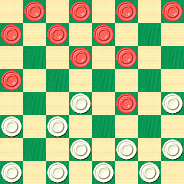
WHITE
White to Play, What Result?
W:W32,31,30,29,28,27,26,22,21,20,18:B19,13,11,10,7,6,5,4,3,2,1.
Put yourself in Hinkley's shoes and work this all out, then click on Read More for the rest of the story.![]()
Have It Your Way
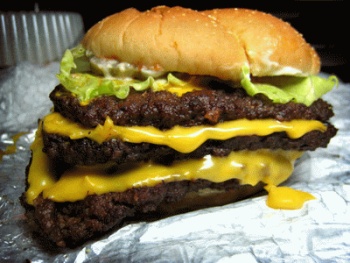
We certainly don't recommend that you consume the entire triple burger shown above in a single sitting, unless you're hungry beyond belief and health considerations are of no consequence. Instead, we recommend you try out today's triple checker problem, in which you can truly have it your way.
The first setting is this.
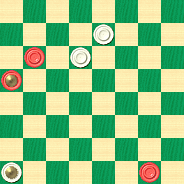
BLACK
Black to Play and Win
B:W26,23,K4:B24,K20,1.
If you don't like the first setting, then move the Black piece on square 1 over to square 2.
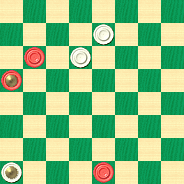
BLACK
Black to Play and Win
B:W26,23,K4:B24,K20,2.
And if even that doesn't please you, move the piece to square 3 instead.
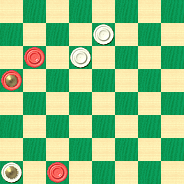
BLACK
Black to Play and Win
B:W26,23,K4:B24,K20,3.
Have it your way--- move the Black piece to any one of the three squares as shown--- and Black will still win. Can you find the correct play in all of the positions?
Try to solve them; they're really not so difficult (well, mostly). Then after you've had it your way, have it our way by clicking on Read More to check your answers.![]()
At the Stroke of Midnight

Did you stay up to see the clock strike twelve this past New Year's Eve? If you're like most of the Checker Maven staff, who are, after all, a little older than they once were, ten o'clock is already a late hour and waiting up for the stroke of midnight is a difficult task.
So instead, let's deal with not a clock stroke, but a checker stroke; that intriguing specimen of a checker problem that, like yogurt and opera, you either love or hate. And, since by now you've surely recovered from possible New Year's Eve revelry, we're setting out a position that is especially bewildering. Just take a look below.
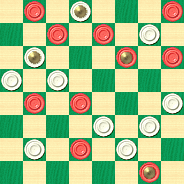
WHITE
White to Play and Win
W:WK2,8,K9,13,14,20,23,24,25,27:B1,4,6,7,K11,12,17,18,26,K32.
Of course, we expect you to solve this one completely from the diagram --- no setting up the board and moving the pieces! When you've clocked your solution, take the time to click on Read More to check your answer.![]()
The Checker Maven is produced at editorial offices in Honolulu, Hawai`i, as a completely non-commercial public service from which no income is obtained or sought. Original material is Copyright © 2004-2026 Avi Gobbler Publishing. Other material is public domain, AI generated, as attributed, or licensed under CC1, CC2, CC3 or CC4. Information presented on this site is offered as-is, at no cost, and bears no express or implied warranty as to accuracy or usability. You agree that you use such information entirely at your own risk. No liabilities of any kind under any legal theory whatsoever are accepted. The Checker Maven is dedicated to the memory of Mr. Bob Newell, Sr.

